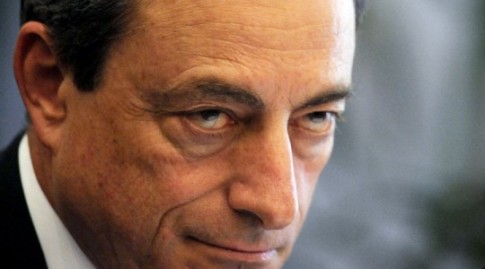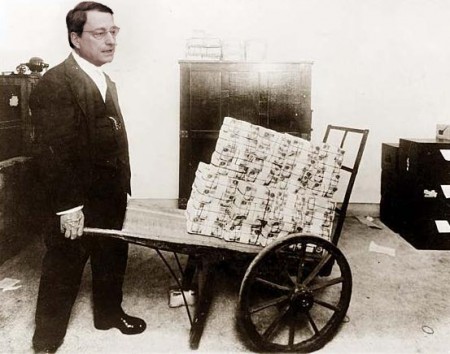The ECB is still purchasing €80 BILLION of ‘bonds’ every month!
– Revealed: ECB Secretly Hands Cash to Select Corporations:
In June, the ECB began buying the bonds of some of the most powerful companies in Europe as well as the European subsidiaries of foreign multinationals. This pushed the average yield on euro investment-grade corporate debt to 0.65%. Large quantities of highly rated corporate debt with shorter maturities are trading at negative yields, where brainwashed investors engage in the absurdity of paying for the privilege of lending money to corporations. By August 12, the ECB had handed out over €16 billion in freshly printed money in exchange for corporate bonds.
Throughout, the public was given to understand that the ECB was buying already-issued bonds trading in secondary markets. But the public has been fooled.
Now it has been revealed by The Wall Street Journal that the ECB has also secretly been buying bonds directly from companies, thus handing them directly its freshly printed money.
It has been doing so via “private placements.” These debt sales are not open to the broader market. There’s no need for a prospectus. Only a small number of institutional investors participate. It allows companies to raise cash quickly, without jumping through the normal hoops. Private placements are not unusual. What’s new is that the ECB used them to buy bonds.
There have been two of these secretive private placements. And Morgan Stanley arranged them. The Wall Street Journal determined this by analyzing data from Dealogic and national central banks.
The two companies involved were the Spanish energy giants Repsol and Iberdrola. The Bank of Spain, now no more than a local branch of the ECB, was among the select buyers of a €500 million bond issued by Repsol. It is also the owner of part of a €200 million bond issued by Iberdrola. Among the advantages of issuing debt in a private placement is that it allows companies to raise cash quickly. According to Apostolos Gkoutzinis, head of European capital markets at law firm Shearman & Sterling, cited by The Wall Street Journal: because there is no prospectus or the other formalities required in a normal bond offering, “there won’t be any transparency, there won’t be a press release. It’s all done discreetly.”
Discretion is something at which the ECB excels. It’s how its most important constituent, the world´s biggest banks and hedge funds, have been able to book vast, risk-free profits by front-running the ECB’s future actions. A decision is made in secret to buy a certain type of asset or to lower interest rates. That decision is then communicated in secret meetings to hedge funds and certain other market participants so that they can buy into those positions and start pushing up prices (and pushing down yields). The ECB already got into hot water over this when it first came out.
The central bank is able to operate this way for two reasons: first, the general lack of public awareness and interest in what it does; and second, the blanket immunity it and its employees enjoy from virtually all forms of legal redress. As we recently reported, the ECB and all of its affiliated national central banks are, by law, above the law of national jurisdictions and answerable only to the European Court of Justice, provided they are fulfilling the functions and responsibilities assigned to them by EU law.
Since the crisis, those functions have mushroomed beyond anything imaginable during the days of the ECB’s creation, in the early 90s, to the extent that the central bank is now arguably the EU’s most powerful institution. The bank’s latest move, to participate in these discreet private placements, was only confirmed when it quietly admitted as much on its website.
Now, the race is on for eligible companies to wet their beaks in this new, much more discreet free-money fountain, while so-called “investors” scramble to divine what the biggest fish in the pond is about to buy next. If they’re lucky they may even get a heads-up straight from the horse’s mouth.The ECB’s favorite banks will also get juicy fees underwriting the deals. The Journal reported that Credit Suisse has already “reshuffled its coverage of national central banks” in an attempt to tap into the new market.
The ECB’s new role as “debt-buyer of first resort” raises a whole litany of concerns. Perhaps worst of all, it grants the ECB an almost god-like grip over Europe’s financial markets: According to The Journal, Citigroup figured “that bonds eligible for ECB purchases have already outperformed ineligible bonds by roughly 30% since the bond-buying program was announced in March.”
It’s Financial Darwinism writ on a heretofore unimaginable scale. Thanks to ECB intervention, Europe’s biggest companies with the strongest finances — including some that are majority state-owned such as French energy giant EDF — are gaining access to funds (many of them public) quicker, more easily, and at cheaper rates than anyone else in the market. From now on, they may even get the money in secret.
It’s an artificial competitive advantage that most companies could only dream of, and which will almost certainly serve to accentuate the concentration and consolidation of Europe’s markets.
All the while, the EU continues to publicly pride itself on the robustness of its competition policy. Just last month, the Commission issued its biggest-ever antitrust fine to great public fanfare, hitting four truck manufacturers with a total penalty of €2.93 billion for illegal collusion. Meanwhile, it turns a blind eye to the role of its partner institution, the ECB, in massively skewing Europe’s corporate debt market even more in the favor of the biggest and strongest. By Don Quijones, Raging Bull-Shit.
The Italian Banking Crisis would complete Europe’s “Doom Loop.” Read… The Impossible Italian Job
* * *
PayPal: Donate in USD
PayPal: Donate in EUR
PayPal: Donate in GBP

